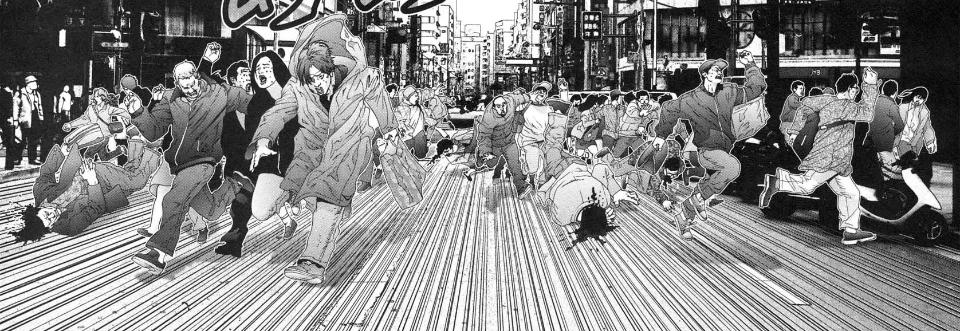Time has really passed and it has been twenty days or so since my arrival in Tokyo. As mentioned last week, I tried to focus the past few days in developing the website and thinking of appropriate texts to be included in it. I then remember about a text which strikes me still very vividly today as part of X which is:
Their Destiny Was Foreordanied.
I am considering to include this text in the web page but before the decision, I'd like to get a copy of X mangas. I have not gotten the time to visit second hand manga shops (as most probably a 1996 comic might not be available in todays shelves anymore).
Adding on to X, I was making some google search on quotes by CLAMP where it got me to this:
There is no such thing as coincidence in this world. The only thing is hitsuzen.
Hitsuzen...
A naturally fore-ordained event. A state in which all other outcomes are impossible.
xxxHolic | CLAMP
I have not read xxxHolic before (which I plan to next week, or at least after I finish whatever I plan to do this week) but the Japanese word of 'Hitsuzen' caught my attention.
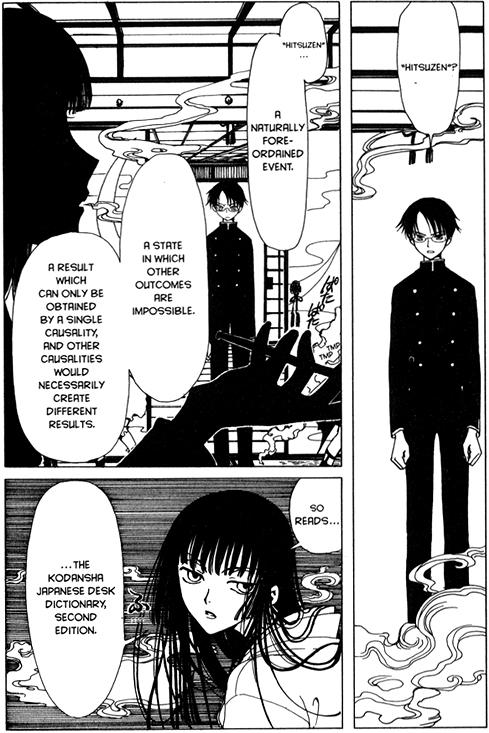
Hitsuzen (必然)
By guzen I will designate things that happen by chance, not in the sense that occur probabilistically, but in the sense that they occur by happenstance and aren’t part of some larger scheme. Thus events that fall in the domain of guzen are meaningless, in the sense that that they are unconnected to other events and thus signify nothing beyond themselves, certainly not some larger scheme or goal.
In contrast hitsuzen is the opposite of guzen. Events that fall under the domain of hitsuzen happen in accordance with some scheme, plan, or design. Thus hitsuzen is meaningful in exactly the way that guzen isn’t. Events that fall under hitsuzen can be understood as connected to other events within that scheme, and thus signify the scheme and its ends as a whole.
To speak in philosophical terms for a moment: hitsuzen manifests teleology, i.e. goals or ends, while guzen does not.
I got this from a blog here.
It is quite a lengthy and to be honest, can be rather confusing to understand but relating to a destiny being foreordained or predetermined, hence hitsuzen, i would like to come event backwards to the initial question:
Why is it wrong to kill humans?
(if I may emphasis that destiny is after all, pre-determined).
However, I do not wish in providing judgement or answers that are considered right or correct to the question but to leave it as a lingering (and in fact, horrifying) reminder that will be the central ideology of this work I am developing.
Moving on (or moving back to X), I was recently reminded that the narrative has yet to conclude. CLAMP has not finished or put an ending to the manga, despite there was an ending for the OVA (one-time movie) and anime (which in your personal perspective of taking the guzen or hitsuzen spectacle, is either a canon or fanon). So I tried to find out on why the manga was left hanging despite fans' please to at the very least, provide more specific hints of finale to the fate of Tokyo, and Earth. I found this:
The main reason for X's hiatus was due to the various societal incidents occurring in Japan at the time of its serialization. With a story centered around the end of humanity, X has numerous scenes depicting earthquakes and the destruction of Tokyo buildings. Many of its cast members met their ends through decapitation and other gruesome death scenes. With events such as the Hanshin earthquake (otherwise know as Kobe earthquake) and the Sakakibara incident, which caused social unrest, many people found it hard to read X, as its contents reminded them of the tragedies they just went through.
and from a 2004 interview enquiring about X's hiatus, CLAMP's members Nanase Ohkawa, Mokona, Tsubaki Nekoi and Satsuki Igarashi provided this answer:
--"X" is your longest-running series, but it's currently on hiatus.
Ookawa: The situation right now is that, due to the graphic nature of our planned ending, getting it published in a magazine is very difficult.
Mokona: Over the 10-odd years that we've been working on "X," we've gone on hiatus several times, and each time, societal incidents and trends have been a major factor.
Igarashi: The biggest ones being the Hanshin Earthquake, and the Sakakibara Incident.
Ookawa: When the Hanshin Earthquake hit and so many peoples' lives were lost, there was a lot of debate, not just within the group but also with our editors, about whether or not we were going to continue using earthquakes as a motif.
Nekoi: I still remember waking up and turning on the TV, and being unable to believe what had just happened. Several people I knew perished in that quake.
Ookawa: We received a letter from a person residing in Kobe at the time, saying that they "couldn't bear to read [X]," which really made us ponder our future.
Mokona: When the Sakakibara incident occurred, the concern was regarding gruesome imagery used in the manga. Regardless of how liberal a manga magazine "ASUKA" was, the multiple beheadings we portrayed in X were going to raise flags.
Ookawa: We had had several discussions with the editorial staff about how perhaps we needed to make changes to the central themes in the manga and how we portrayed them, but we had still managed to gain the understanding of various people and work through them. But, we were then told that it may not be possible for our publisher to serialize the ending we had planned. If that was true, it would mean that we would have to write a different ending to the story in order to have it published. Excluding cases where the magazine we were serialized in folded, we have never quit on a series before (though we may have gone on hiatus), so obviously we definitely want to work on "X" until completion, but currently that's looking very difficult. But, regardless of what form it takes, we want to write up a conclusion to the story.However, I want to make it very clear that none of what transpired is the publisher's fault; on the contrary, we would like to express our sincere gratitude for being tolerant and willing to publish "X" for all this time. We will continue to search for solutions and hold discussions with our publisher, so I hope that you will grant us a little more time yet.
(more on the interview here)
I am not very familiar with how sensitive materials for fictions affect the general public of Japanese audience but it is advisable to take into great consideration the strength of visual culture and narratives. I remember blockbusters were edited or their release dates halted after the incident of 9/11 (more here) and this definitely affected CLAMP and their production of X as well. I did get the chill as I was reading Gantz and Psyren especially where as human lives are involved, they seem to value almost nothing at all. Reminiscence of death is without any doubt painful and I might need to pay attention in considering the development of this project.
Moving forward, I went to look into the two tragedies mentioned, mainly the Hanshin Earthquake as well as the Sakakibara Incident. As this project involved 'killing' and murder, I would like to leave natural disaster aside but focus more on when decisions were made by a person or more in attempting to snatch someone elses' life. Hence the Sakakibara incident. To my surprise, and extremely uncomfortable reading, the murder was not only inhumane but shocking as it involved the deaths of two children committed by a fellow child. Here is a rough story of the murder.
And to my surprise, a quick google search brought me to the following images. (I was actually looking for images like this previously but was told by several sources that they are almost impossible to retrieve).
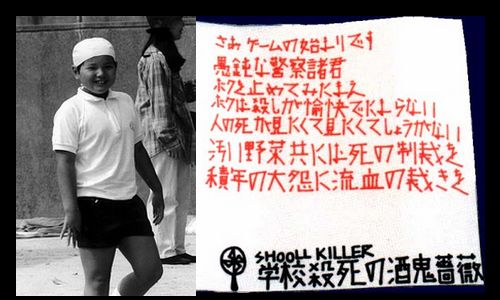
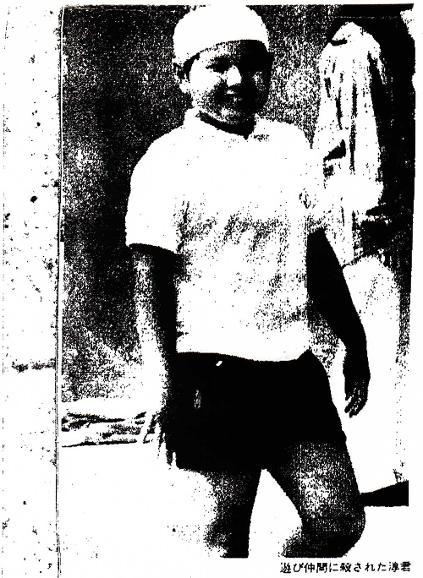
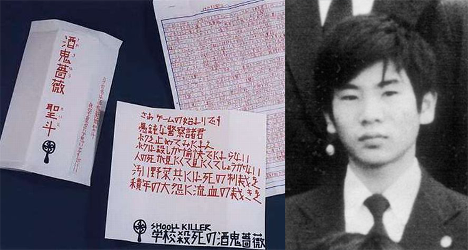
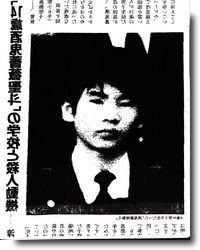
I have worked with nudity almost ever since I started my practice and although it may still be considered unethical, I feel its portrayal as visual culture should be acceptable, if not encouraged. (I have several theory to back it up, especially in relation to how we see masculinity today. Geddit Manet? :P
But jokes aside, I am still not extremely sure about child murder and deaths, which I guess was very recently debated as well with the case of Aylan Kurdi, which was made worse when Charlie Hebdo did a cartoon of the incident. I am not extremely sure if the visuals above are authentic, which I will look again in my next step of research.
Anyway, as I digest this dilemma, this is a link of recorded famous murders in Japan. There seems to be several cases where the intention was simply "wanting to kill" or "experience murder" without any personal relationship between the victims and the perpetrators.
A recent murder case of 13 years old Natsumi Hirata was also quite a famous piece of news which can be read here.
As an additional interesting point, children involved in such cases are often kept anonymous, in particularly their identity and names. They are usually labeled as Boy A or B or C, so on and so forth.
I have also noticed there are several highlighted cases of massacre which might have motivated the event of Shinjuku Massacre in Gantz. It is one of the most uncomfortable chapter to digest and recently I visited Shinjuku and noticed the staircases outside the station where it all began. It was chilling. In Gantz, the massacre occured on 13 March 2003, committed by Shion Izumi after receiving instructions to bring more people into the Gantz's room. He translated this into mass killing and an attempt to get back into the room himself.
